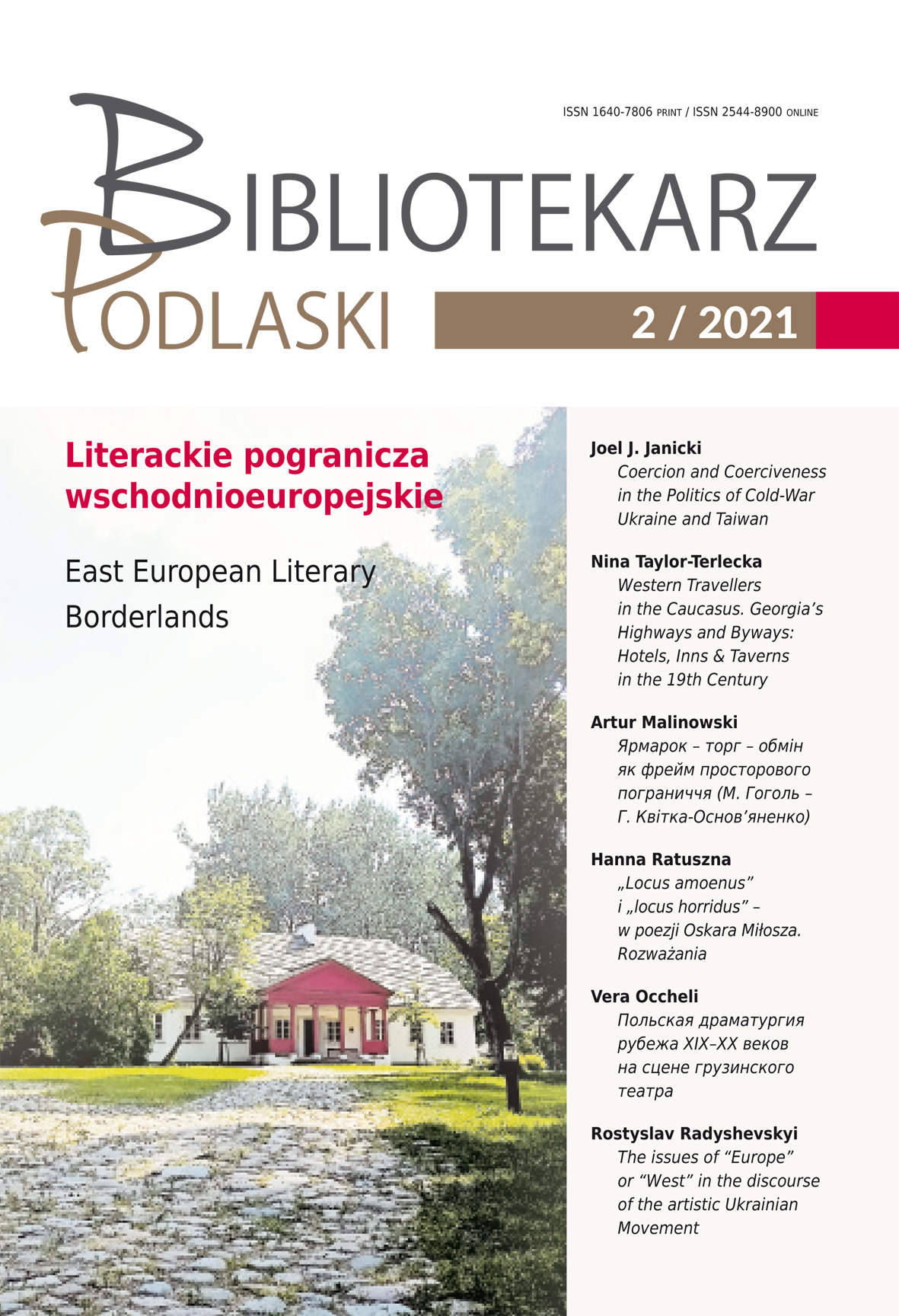Abstract
The focus of the present article is on Czesław Miłosz poetry in which the Nobel Prize winner returns to his childhood places and people who played a significant role in the formation of his personality and identity. The poet links specific sides of his personality with his birthplace, Szetejnie on the River Nevezis, located “in the heart of Lithuania”. In his poetry, Miłosz devotes special attention to his mother, Weronika, from the Kunat family, and pays less attention to his father. He also remembers his grandfather Zygmunt Kunat, his wife Janina and other distant relatives. Miłosz creates the image of home and family through detailed poetic descriptions evoking at times episodes of a close relationship with his family members. Thus, the poet intends to express his appreciation for places that he is part of and gratitude to those who contributed to his existence in time, his formation and journey to eternity.
References
Brzóstowicz M., Dom rodzinny w „Dolinie Issy”: obecność i wartość, „Pamiętnik Literacki” 1997, z. 2, s. 13-32.
Daujotytė V., Kvietkauskas M., Lietuviškieji Česlovo Milošo kontekstai, Lietuvių literatūros ir tautosakos institutas, Vilnius 2011.
Fiut A., „Autoportret przekorny”. Rozmowy z Czesławem Miłoszem, Kraków 2003.
Fiut A., Moment wieczny. Poezja Czesława Miłosza, Kraków 2011.
Franaszek A., Miłosz. Biografia, Kraków 2011.
Jarzębski J., Gra w Gombrowicza, Warszawa 1982.
Ławski J., Miłosz: „Kroniki” istnienia. Sylwy, Białystok 2014.
Mikołajczak M., „Jak bardzo trzeba cenić prowincję”. O (inspirującej) autobiografii Czesława Miłosza na podstawie wiersza „Mój dziadek Zygmunt Kunat”, [w:] Zagadnienia bilingwizmu, red. Ł. Zabielski, T. I: Dwujęzyczni pisarze litewscy i polscy, red. nauk. A. Baranow i J. Ławski, Białystok-Vilnius 2017.
Miłosz Cz., Rodzinna Europa, Kraków 1994.
Miłosz Cz., Wiersze wszystkie, Kraków 2011.
Turkiewicz H., „Krajobrazy i być może duchy Litwy nigdy mnie nie opuściły”. Wyznaczniki małej ojczyzny” w poezji Czesława Miłosza, [w:] Pogranicza, cezury, zmierzchy Czesława Miłosza, red. A. Janicka, K. Korotkich, J. Ławski, Białystok 2012, s. 31-50.
Articles published in the “gold open access” mode on the basis of a non-exclusive license agreement between the publisher and the author. Permitted use:
- the publication may be read and stored on any device,
- the publication may be cited (with obligatory reference to the author, the title of the text, as well as the full title, bibliographic address of the issue and page of the journal)
The editorial team of “Bibliotekarz Podlaski” implements an open access policy by publishing materials in the form of the so-called Gold Open Access. From volume 42 (issue 1/2019), the journal is available under the Creative Commons license (Attribution – ShareAlike: CC BY-SA).
The key declarations of the Open Access and Open Science movement, which we fully support, are available on the CEON Open Science website.
COPYRIGHT:
The editorial team of “Bibliotekarz Podlaski” implements an open access policy by publishing materials in the form of the so-called Gold Open Access. The journal is available under the Creative Commons license – Attribution – ShareAlike 4.0: International: CC BY-SA 4.0).
The key declarations of the Open Access and Open Science movement, which we fully support, are available on the CEON Open Science website.
“Bibliotekarz Podlaski” allows its readers to read, download, copy, distribute, print, search and link to the full content of articles. We enable full, immediate, unlimited (both in a territorial, temporal and technical sense) open access to all published content, in accordance with the principle that freely available research increases and accelerates the global development of science and the exchange of knowledge.
The editorial team of “Bibliotekarz Podlaski” encourages authors to place articles published in the journal in open repositories (after the review or the final version of the publisher), provided that a link to the journal’s website is provided.
The journal does not charge the authors any fees for accepting and publishing their texts.


